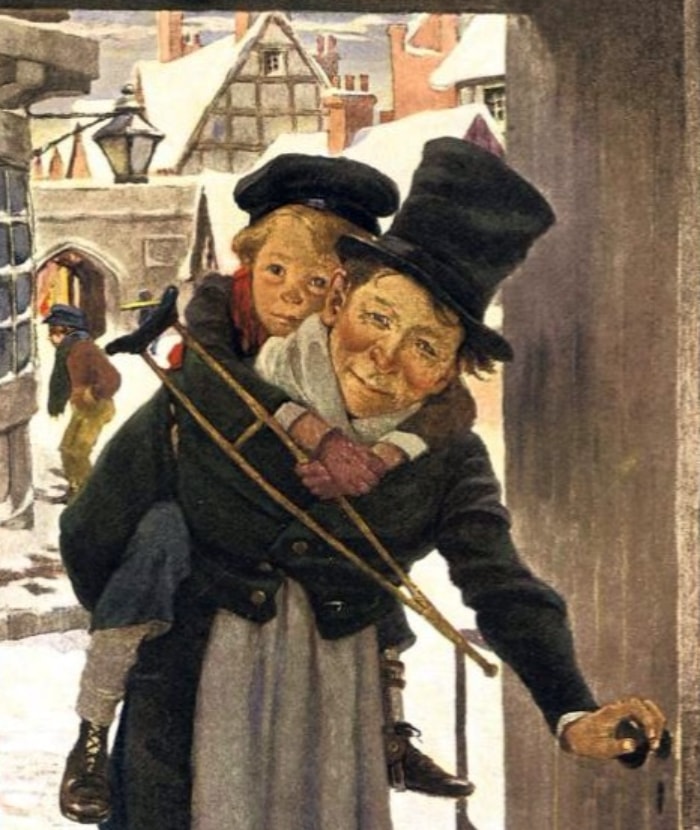
Spiritual Sunday – 1st Sunday of Advent
The indispensable website Journey to Jesus has alerted me to Jim McPherson’s “December Humbug.” The poet echoes Scrooge but in a good way: the poet doesn’t challenge Christmas itself but the way it has been commercialized.
For a reminder, here’s Scrooge’s case against Christmas:
“Come, then,” returned the nephew gaily. “What right have you to be dismal? What reason have you to be morose? You’re rich enough.”
Scrooge having no better answer ready on the spur of the moment, said, “Bah!” again; and followed it up with “Humbug.”
“Don’t be cross, uncle!” said the nephew.
“What else can I be,” returned the uncle, “when I live in such a world of fools as this? Merry Christmas! Out upon merry Christmas! What’s Christmas time to you but a time for paying bills without money; a time for finding yourself a year older, but not an hour richer; a time for balancing your books and having every item in ’em through a round dozen of months presented dead against you? If I could work my will,” said Scrooge indignantly, “every idiot who goes about with ‘Merry Christmas’ on his lips, should be boiled with his own pudding, and buried with a stake of holly through his heart. He should!”
Somewhat like Scrooge, McPherson talks of “December’s wild collective madness” when “we all submit like slaves to Santa’s lash/ and with our hearts and minds and credit cards/ crown Santa as de facto Season King.” While we “dream of better things/ beyond injustice, misery and toil,” this “cargo cult” figure who lives far from humanity offers only “tinsel hope and brittle joy.” Although the season is meant to celebrate the moment when God entered the world in human form, we settle for “Santa’s baubles or his sugared grift.”
Incidentally, Dickens is largely responsible for why we celebrate Christmas the way we do. Yet lest we blame him for the commercial extravaganza the season has become, we can look to Scrooge’s nephew to see what the author actually thought:
“Nephew!” returned the uncle sternly, “keep Christmas in your own way, and let me keep it in mine.”
“Keep it!” repeated Scrooge’s nephew. “But you don’t keep it.”
“Let me leave it alone, then,” said Scrooge. “Much good may it do you! Much good it has ever done you!”
“There are many things from which I might have derived good, by which I have not profited, I dare say,” returned the nephew. “Christmas among the rest. But I am sure I have always thought of Christmas time, when it has come round—apart from the veneration due to its sacred name and origin, if anything belonging to it can be apart from that—as a good time; a kind, forgiving, charitable, pleasant time; the only time I know of, in the long calendar of the year, when men and women seem by one consent to open their shut-up hearts freely, and to think of people below them as if they really were fellow-passengers to the grave, and not another race of creatures bound on other journeys. And therefore, uncle, though it has never put a scrap of gold or silver in my pocket, I believe that it has done me good, and will do me good; and I say, God bless it!”
In other words, he too is grateful to a God whose feet, in McPherson’s words, “have touched the ground” (unlike the airborne Santa’s) and given us a vision beyond “injustice hunger and fatigue.” While less grumpy than McPherson, the nephew will not be settling for “happy pills.”
Think of “December Humbug” as a useful satiric corrective for when we lose sight of what is really important.
December Humbug
By Jim McPherson
December’s wild collective madness strikes!
We all submit like slaves to Santa’s lash
and with our hearts and minds and credit cards
crown Santa as de facto Season King.
Remote from human suffering at the Pole,
he speaks to those who dream of better things
beyond injustice misery and toil
to offer tinsel hope and brittle joy:
“Just come to me, and I will bring relief ‑
my cargo cult will save you from your grief.”
I cannot soil the Incarnation’s gift
with Santa’s baubles or his sugared grift
Give me the God whose feet have touched the ground
and walked with us as human as ourselves
to celebrate our joys and share our pain;
who’s borne injustice hunger and fatigue
and who, foreswearing all escape, endured
our human death; and Death’s defeat secured.
December’s now the torment of my year;
while Santa’s bogus claims assault my ears
the One we fete, who lived our living’s ills,
is trampled in the rush for happy pills.

